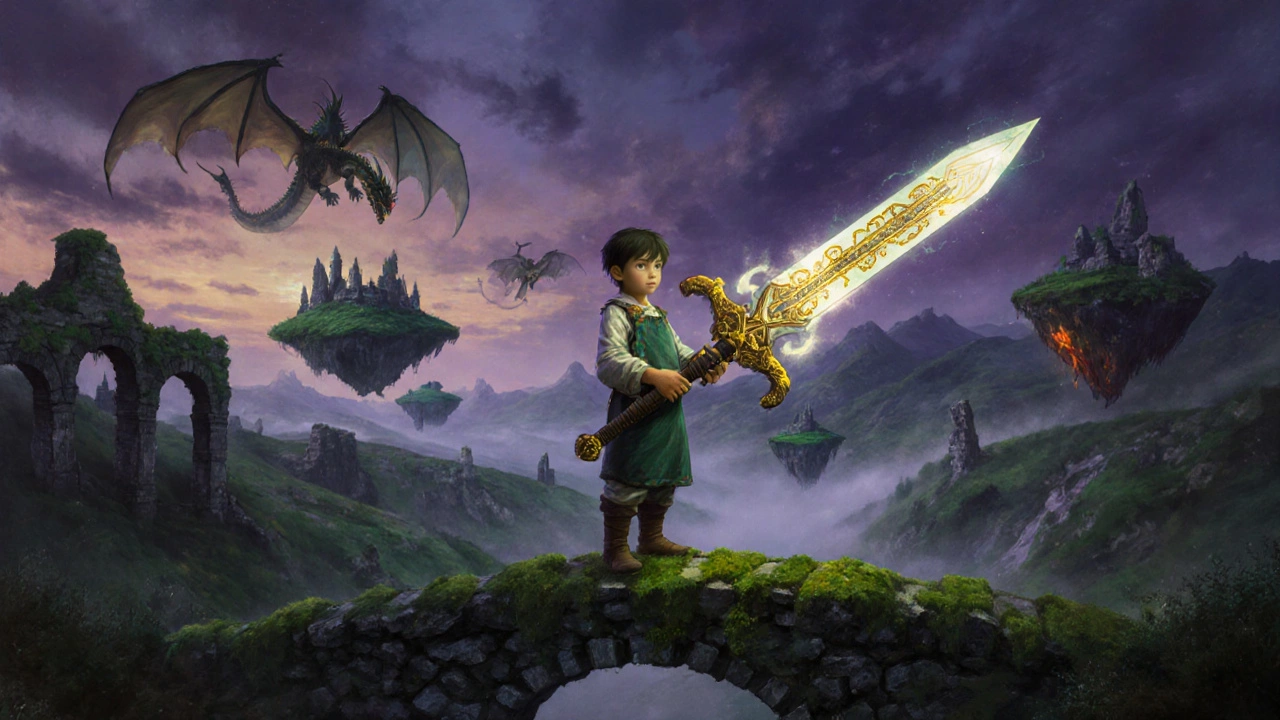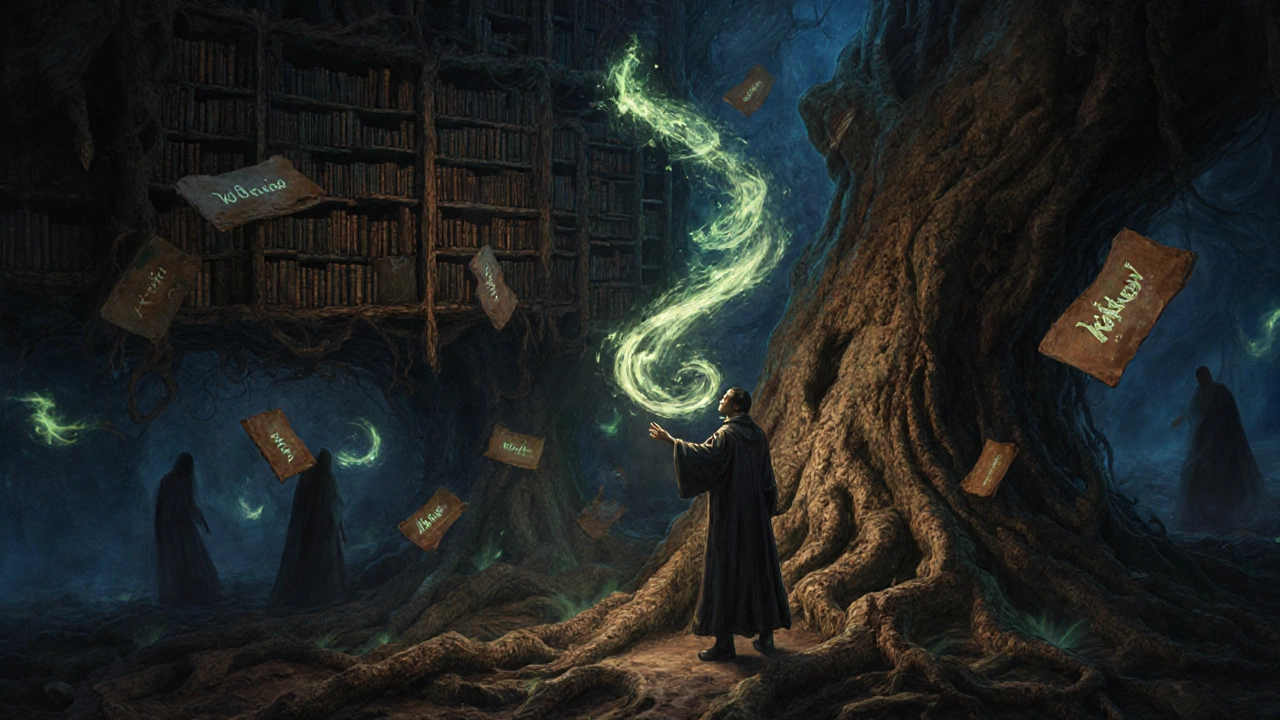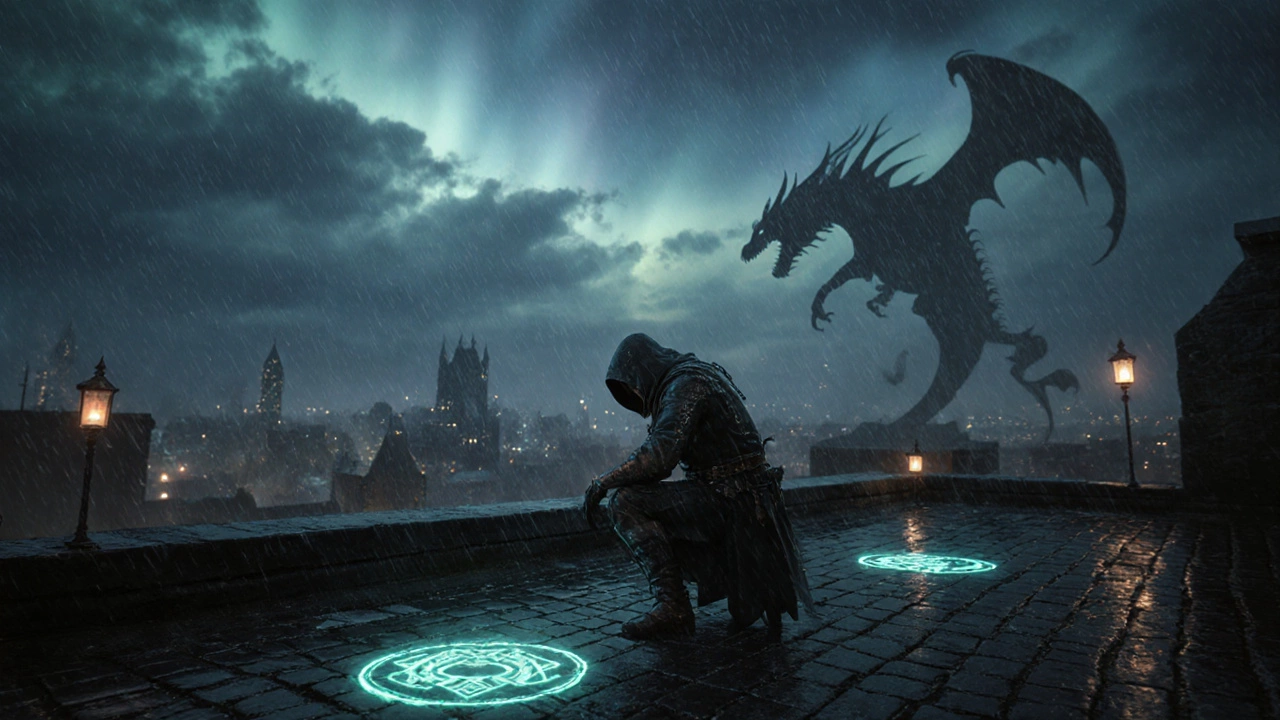What Makes a Book Fantasy? The Core Elements That Define the Genre
 Nov, 21 2025
Nov, 21 2025
Fantasy Genre Checker
Is It Fantasy?
This tool helps determine if a story qualifies as fantasy based on the core elements discussed in the article.
Results
Criteria Analysis
How to improve your story
For a story to qualify as fantasy, it must include all 4 core elements:
- Break natural laws with supernatural elements
- Establish consistent magical rules
- Integrate magic into culture and daily life
- Use fantasy to explore human themes
Think of a book where dragons fly over floating islands, where magic flows like water through a river, and where a farm boy picks up a sword that wasn’t made for him-but somehow, it fits. That’s fantasy. But what actually makes a book fantasy? It’s not just about wizards or elves. Those are details. The real heart of fantasy lies in what the world allows that our world doesn’t.
Reality Has Rules. Fantasy Breaks Them.
In our world, gravity pulls things down. You can’t turn water into wine with a whispered word. Dead people don’t come back unless science says so. Fantasy doesn’t care about those rules. It builds worlds where the impossible is ordinary. That’s the first and most essential trait: the presence of supernatural or magical elements that cannot exist in reality.
Think of The Lord of the Rings. Gandalf doesn’t just know a lot-he resurrects himself after falling into a pit of fire. That’s not science. That’s magic. In Harry Potter, a child receives a letter delivered by owl, and it’s not strange-it’s expected. In these stories, magic isn’t an exception. It’s part of the system. It has laws, costs, and limits. That’s what separates fantasy from just weird fiction: structure.
Worldbuilding Isn’t Just Background-It’s the Foundation
Fantasy doesn’t take place in a version of Earth with a few extra creatures. It creates entire systems. You need to know how the magic works. Who controls it? Who fears it? What happens if someone uses too much? These aren’t side notes. They’re the engine of the story.
In Patrick Rothfuss’s The Name of the Wind, magic is tied to naming things. To control something, you must know its true name. That’s not random. It’s a consistent rule. That’s why readers feel it’s real. The world has internal logic. Even if you can’t explain it with science, you can predict how it behaves.
Compare that to a story where someone waves a wand and suddenly a castle appears. No cost. No consequence. No explanation. That’s not fantasy. That’s wishful thinking. Good fantasy makes the impossible feel inevitable.
Myth and Legend Are the DNA of Fantasy
Fantasy doesn’t come from nowhere. It pulls from ancient myths, fairy tales, and folklore. Dragons aren’t just big lizards-they’re symbols of greed, power, or chaos from cultures across the world. Elves aren’t just pointy-eared humans; they’re echoes of forest spirits from Norse and Celtic stories.
When J.R.R. Tolkien wrote The Silmarillion, he didn’t invent elves and dwarves out of thin air. He studied Old English poetry, Norse sagas, and Finnish mythology. He rebuilt them. That’s why his world feels deep. It’s not new-it’s ancient, rewritten.
Modern fantasy still does this. In N.K. Jemisin’s The Broken Earth trilogy, the magic system is tied to seismic energy and ancient gods. It’s not magic for magic’s sake-it’s rooted in real-world geology and mythological cycles of destruction and rebirth.

Heroes Don’t Need to Be Chosen-They Just Have to Care
Not every fantasy hero is a prophecy-bound child. Some are soldiers, scholars, or outcasts who stumble into something bigger. What matters isn’t their birthright-it’s their choice.
In The Lies of Locke Lamora, Locke is a thief, not a king. He doesn’t have magic. He doesn’t have a destiny written in stars. He survives by wit, lies, and sheer stubbornness. And yet, this is fantasy. Why? Because the world around him is ruled by sorcerers, ancient curses, and hidden gods. His humanity stands out because the world is so far from ours.
That’s another clue: fantasy often uses the extraordinary to explore ordinary human struggles. Power. Loss. Identity. Morality. The magic just makes those questions louder.
It’s Not About Monsters-It’s About Meaning
Yes, there are trolls, demons, and talking animals. But those aren’t the defining features. They’re decorations. The real question is: what do they represent?
A dragon isn’t just a big beast. It’s greed made flesh. A cursed sword isn’t just sharp-it’s the weight of past sins. A forest that remembers every footstep? That’s nature fighting back against exploitation.
Look at His Dark Materials by Philip Pullman. The daemon isn’t just a pet-it’s a physical part of a person’s soul. That’s not fantasy for spectacle. That’s fantasy as metaphor. It’s using the impossible to talk about real things: identity, freedom, religion, love.
What Fantasy Is Not
Fantasy isn’t sci-fi. Spaceships and AI don’t make a story fantasy-even if they’re glowing or sentient. That’s speculative fiction, but it’s grounded in science, even if it’s far-fetched. Fantasy is grounded in myth, not physics.
Fantasy isn’t horror, even if it has monsters. Horror wants you to fear the unknown. Fantasy wants you to wonder what’s possible.
Fantasy isn’t fairy tales, though they’re cousins. Fairy tales are short, moralistic, and often simplistic. Fantasy is complex, layered, and usually longer because it needs to build a whole world you can live in.
And fantasy isn’t just for kids. The idea that it’s all about magic swords and talking animals is a stereotype. Look at The First Law trilogy by Joe Abercrombie. It’s brutal, cynical, and full of magic. But it’s also about corruption, loyalty, and what happens when people believe in lies.

So, What Actually Classifies a Book as Fantasy?
Here’s the simple test:
- Does the story take place in a world where at least one law of nature as we know it is broken?
- Is that broken rule part of a consistent system (magic, divine power, ancient spirits, etc.)?
- Does that system shape the culture, politics, and daily life of the characters?
- Does the story use the impossible to explore human truths?
If you can answer yes to all four, you’ve got fantasy.
It doesn’t matter if the setting is medieval, futuristic, or on another planet. It doesn’t matter if the magic comes from gods, blood, or words. What matters is that the world runs on rules that don’t exist in ours-and those rules matter to the story.
That’s why a book like The Priory of the Orange Tree-with its dragon-riding queens and ancient sea gods-counts as fantasy. And so does The Poppy War, where spirits whisper in dreams and warlocks burn cities with their minds. Both are fantasy because they don’t just add magic. They rebuild reality.
Why This Matters
Understanding what makes fantasy fantasy helps you find the books you’ll love. If you’re drawn to stories where the world feels alive because it bends its own rules, you’re looking for fantasy. If you like stories where the magic has consequences, where the hero isn’t perfect, and where the impossible feels real-that’s the heart of the genre.
It’s not about escaping reality. It’s about seeing it more clearly through a different lens.
Is Harry Potter fantasy or science fiction?
Harry Potter is fantasy. Magic is built into the world’s foundation-spells, magical creatures, enchanted objects-all operate on rules that have no basis in science. There are no spaceships, AI, or futuristic tech. The magic system is consistent, culturally embedded, and tied to mythic traditions, which are core markers of fantasy.
Can fantasy be set in the real world?
Yes. Urban fantasy, like Neil Gaiman’s Neverwhere or Jim Butcher’s Dresden Files, takes place in our world-but hidden beneath it is a secret magical layer. The key is that the supernatural elements are real and active, not imagined. Magic exists alongside traffic lights and coffee shops. The world still breaks natural laws, even if it looks familiar.
Do all fantasy books have dragons?
No. Dragons are common, but they’re not required. Many fantasy novels have no dragons at all. The Lies of Locke Lamora has no magic. The Fifth Season has no dragons. What matters is whether the world operates on impossible rules. A society ruled by ghosts, a land where emotions become weather, or a city built on a sleeping god-all are fantasy without a single scale.
Is The Chronicles of Narnia fantasy?
Yes. Narnia has talking animals, witches who control winter, and a lion who is both a god and a king. The world operates on mythic logic, not scientific rules. Even though it’s set in a parallel world accessed through a wardrobe, it fits every criterion: supernatural elements, internal consistency, cultural impact, and symbolic meaning.
What’s the difference between high fantasy and low fantasy?
High fantasy takes place entirely in an alternate world-Middle-earth, Westeros, or the Land of Oz. Low fantasy happens in our world, where magic intrudes-like a hidden guild of sorcerers in modern London. The difference is setting, not power. Both are fantasy. High fantasy is epic and world-sized. Low fantasy is intimate and hidden. Both can be just as powerful.
Where to Go From Here
If you’re trying to find more books like this, start with the ones that made you feel like the world was alive. Look at who wrote them. Look at what kind of magic they use. Look at how the characters change because of it. That’s your map.
Fantasy isn’t about what’s on the page. It’s about what’s possible. And sometimes, that’s the only kind of truth that makes sense.